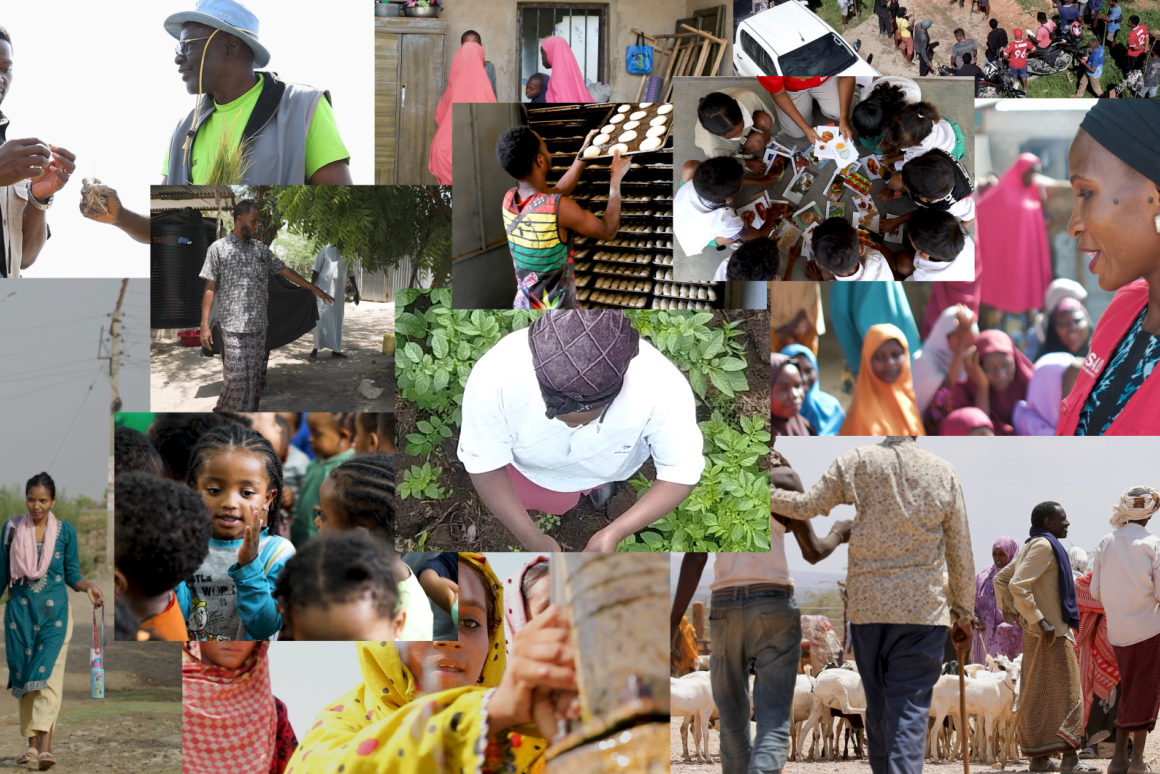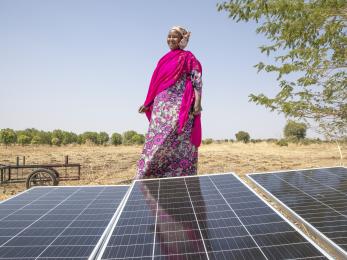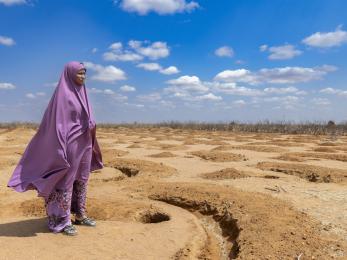Empower a woman, unleash a leader: Why we support young female entrepreneurs
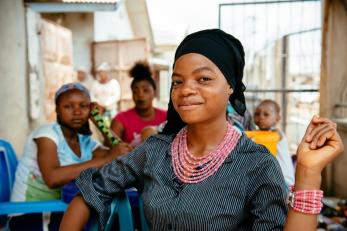
“There is nothing [a] man can do that a woman cannot do,” Rashidat says with a confident grin.
At just 18, she knows something we do, too: A woman empowered with knowledge and resources is a source of unstoppable change.
Approximately $17 trillion could be added to the global economy if women had the same access to jobs and income as men do. And research shows when women are given an equal voice in their communities, their children are healthier, their lives are more stable and their societies are more peaceful.
Yet oppressive cultural traditions and limited access to education, job training and financial services regularly keep them from thriving. Many of these women have been doing unpaid domestic labor since they were very young, but have not experienced the empowerment of getting paid for their work.
That’s why we believe in investing in young women like Rashidat. We help them gain skills, build livelihoods and reach their goals, unleashing their potential to improve their lives and become leaders for their families and the world.
Below, learn more about Rashidat and some of the other young women we’re working with around the world. With our support, they are overcoming obstacles, pursuing their dreams and guiding their communities toward a brighter tomorrow.
Explore our special series about the critical ways we work with youth ▸
Rashidat, 18

It’s hard for a girl to prosper in Nigeria. Poverty, indifference, and early marriage and pregnancy prevent many from completing their educations or enrolling in school at all. Right now, millions of girls across the country aren’t enrolled, which puts them at risk of never reaching their full potential.
Rashidat was forced to drop out when she was just 7 years old.
“I lost my parents,” she explains. “That is when I stopped schooling.” She moved in with her aunt and uncle but wasn’t able to return to her education.
As she grew older she faced more obstacles: access to job training and banking services is limited for girls, too. But even when her options to succeed were bleak, she never lost hope. “I always believed I would be great,” she says.
Her life took a turn when she got involved in Mercy Corps job training program, made possible with support from The Coca-Cola Company, Mastercard Center for Inclusive Growth and the UK Department for International Development. The program provides in- and out-of-school girls in Nigeria with life skills, business training and financial education, so they are better equipped to support themselves and their families.
“My favorite topic is how to start a business with small capital and loan taking,” Rashidat says, “... because I never knew about it before. [When I learned that] I saw a way forward.”
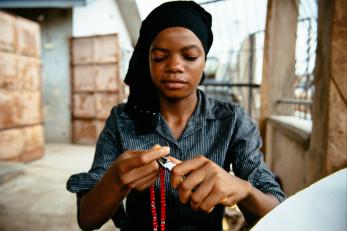
Empowered with knowledge and inspired by her love of fashion, she started putting small amounts of money away whenever she could, eventually saving enough to buy tools and beads to start a small jewelry-making business.
Already, her handmade accessories — necklaces, bracelets, belts, purses — are in high demand. “I’m always happy when I see people wearing my beads,” she says. “I will look at them and say ‘I am the one who did this.’ I feel proud of myself.”
Now, Rashidat has plans to expand. “I want to have a shop. I want to have a business card. I want to be great,” she says. Her business is so successful she’s even hired several other young women and taught them how to bead, though she hopes they eventually leave to start their own ventures, too.
“There are so many things girls can become in the future,” she says. “Girls are talented. There is nothing you give a girl that she cannot do.”
Charity, 19
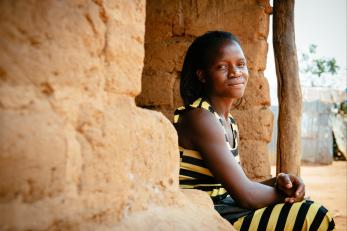
Charity was vulnerable to similar hazards growing up in Nigeria. Her father died when she was young, and her mother struggled to support her. She managed to attend school, but dropped out when she became pregnant at 16, an all-too-common occurrence for young girls in her community.
She married and had her daughter, and for two years, she despaired. “I was not doing anything. I was just saying ‘my future is useless,” she explains.
But at 18, she got involved in Mercy Corps’ job skills program supported by The Coca-Cola Company, Mastercard Center for Inclusive Growth and the UK Department for International Development. She learned life skills and basic financial literacy, and began to see that she could make something more of herself and build a better life for her family.
The lesson in savings was particularly transformative for her. “[Before] I was just making use of [my money] in a useless way,” she says. “But since I joined the program, I see that everything that comes my way, even 5 naira (2 cents), is important in my life.”
She started saving every naira she could until she had enough to buy supplies to start her own retail business. She started small, she says, only selling soap, salt and beverages — but she kept saving, eventually collecting enough to build her own shop and expand her wares.
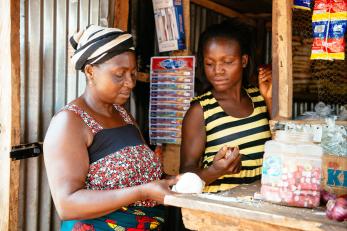
Now, just a year after first hearing about the job skills program, she runs the store she calls her own, a small wooden hut at the end of the town’s dusty main street, selling food and household provisions to passersby.
A young female business owner is a rarity in her community, but Charity is proud to change the narrative. “Some say they do not believe it, because someone like me can not own a shop on her own. [But] I say I’m the owner of it.”
“I feel so happy,” she says. “I’m so happy to run my own [shop]. No one pays me, I pay myself.”
Charity dreams of growing her business even more and, one day, becoming a wholesaler. And she has a new sense of accomplishment being able to contribute to her family and give her children a good life.
She wants people to know her family’s name, she says, and for her kids to achieve even more than her. “I want them to go to school so their future will be great.”
Olga, 22, and Ana, 19

The menu of the Cafeteria Saaj Poyanam in a remote community near Chisec, Guatemala is filled with foods grown right in the village: plantains, yucca, elote, oranges, malanga root, bananas, beans, coconut, cacao.
Behind the counter of the bamboo structure — behind everything involving the business, actually — are young people like Olga and Ana. The sisters worked with a larger group of youth to start the restaurant because they wanted to provide healthy food options in their community.
Around 80 percent of the population in rural Guatemala lives in poverty. Many suffer from chronic malnutrition. And opportunities — jobs, education, financing — to build a better life are slim.
But through a partnership between Mercy Corps and the Starbucks Foundation, Olga, Ana and other youth received business training and a small amount of seed money to start a new venture. Two years later, the business is successful and run entirely by the young people who initially dreamed it.

In addition to the community-wide benefits of serving healthy, regional food, the the ability to start a local business provided the girls with the chance to build lives for themselves close to home. In an impoverished area of the country where young people often migrate to the city for a lack of opportunities, it was something that felt nearly impossible before.
The venture has been life-changing for the sisters. And it has given Olga, who only attended school through ninth grade, renewed confidence and hope about her future.
“Nothing is going to take what I’ve learned away from me,” she says. “Every day and night I think about how I’m going to grow this business — what to do, what to sell, how to talk with the other youth to see how we’re going to work and get organized. If we don’t work, we’re not going to make this grow.”
Dahara, 14
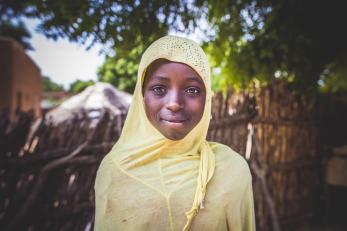
If Dahara was following Nigerien tradition, she would be readying to marry as early as next year. Three out of four girls in her country are married before the age of 18. Few finish school. Many become mothers before they become adults.
But Dahara isn’t one to adhere to custom.
“I would not accept,” she says, when asked what she would say if a boy proposed to her today. She’s determined to wait until she is at least 18 or 19 years old because, right now, she has other things she wants to focus on: her schoolwork, her chores, her business.
Dahara is a member of the Mercy Corps safe space group in her village, a dedicated place just for girls to come together to learn about things that can help them build a better life — job skills, reading and writing, health and nutrition — but that they typically don’t have access to.
It’s through the group that Dahara was emboldened to start making her own money. “We were told that each of us had to choose what we wanted to get training on,” she says, “and I chose this.”
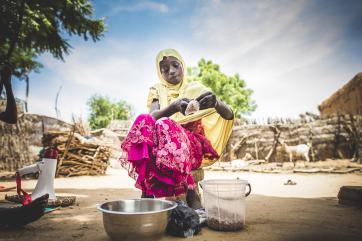
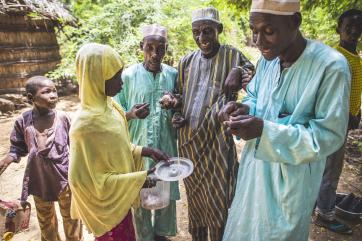
Now, every day after school, Dahara perches a kettle of water over an open flame in front of her home, using the heat to boil and caramelize nuts that she bundles into small packages and sells in her village for about 5 cents apiece. Every day, she sells out, making enough in profits to restock her supplies and set some funds aside.
The money has given her a command on her life that is rare for girls in Niger. She has savings. She buys her own clothes. She can invest back in her business if she wants to. And she knows, now, that she can dream bigger and contribute to her community in a way she didn’t realize before.
“I’m happy because each of us [girls] have learned what to do,” she says. “I want to be a good person. I want to be a teacher.”
Dorsaf, 19

There are obstacles to success in Tunisia, to be sure, admits Dorsaf. “[But] as long as we are standing on our feet, I believe in Tunisia,” she says.
In the wake of the political revolution that spawned the Arab Spring, Tunisia is still struggling with inadequate social services and a sluggish economy. A lack of industry and economic opportunity make it very challenging to make a living anywhere outside the capital city, Tunis. And unemployment for young people, who make up half the country’s population, soars at around 30 percent.
None of this has deterred Dorsaf, though. “When we want something, we get it,” she says. “Whatever happens, there will come a day [when] we will make it.” As a member of Mercy Corps entrepreneur club in Djerba, Dorsaf is learning skills to help her build her sewing business, including customer service, work ethic, networking and interviewing.
“I wasn’t able to express myself [before],” she says. “[Now] I’ve gained self-confidence. I learned how to deal with customers.” And with Dorsaf’s newfound assurance comes determination, a steady resolve not just to build herself up, but to advance her country as well.
“I want [Tunisia’s] name to be respected among all countries,” she says. “I want that when I do something, people say ‘she is Tunisian.’ I love the name of Tunisia.”
With her new skills, Dorsaf has plans to design haute couture clothing and represent Tunisia by holding fashion shows around the world.
“Whatever happens I will strive and I will work and I will go the extra mile until I make it, until I reach my goal,” she says.
Zipporah, 23

“Looking back some few years ago, I never thought I would make it in life, because there are so many challenges to opportunity [for] people in Kenya,” says Zipporah.
It’s a common sentiment for young people in her country: jobs and resources are largely only available to those who are well-connected or wealthy, and unemployment is high. These circumstances drive frustration and hopelessness for youth who want to build a better life.
Coming from a poor family, Zipporah, who prefers the nickname Zippy, didn’t believe she had a future. “It was hard for me. There was no certainty of me getting to my goal or my dreams,” she says.
That’s why Mercy Corps developed youth bunges (the Swahili word for parliament) throughout the country to provide young Kenyans, like Zippy, with a structure to work together to create livelihoods and address social issues — drug abuse, unemployment — in a productive way.
Through the bunge, Zippy received financial training and was connected to a mentor who helped her identify her goals, network, access business resources and develop confidence.
“Mentorship has been a very important part of my transformation,” she says. “If I was not mentored, I would probably never realized who I am and my potential. It’s through mentorship … I know who I am today.”
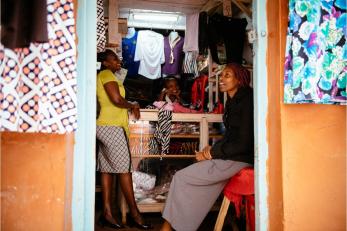
Since getting involved in the bunge, Zippy has completely changed the trajectory of her life, becoming a leader in her youth group, and a savvy entrepreneur with two clothing shops and a cybercafe, and farming on her family land.
Her success has shown her what she is capable of and — far from the girl who once didn’t think she would amount to anything — she now has even loftier goals for herself and her country.
She now sees herself as someone who can effect change in her community; she wants to run for local office in the next election.
“Every day I am challenged with whatever is going on in society, and I feel if I’m not the change, who’s the change?” she says.
